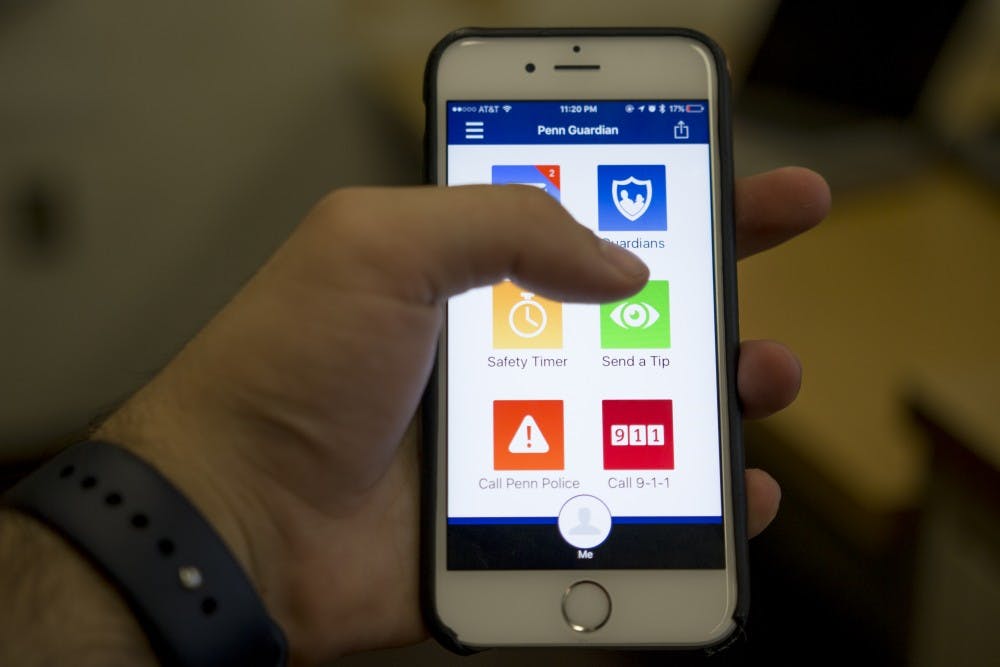
Penn Guardian allows students to anonymously report various incidents, ranging from sexual assault to drug and alcohol cases.
Credit: Julio SosaIn order to combat the epidemic of sexual violence on college campuses, investigators have recently experimented with alternative ways of reporting sexual misconduct.
At Take Back the Night on April 7, Vice President for Public Safety Maureen Rush explained how students could use the Penn Guardian app to anonymously report sexual assaults.
In 2011, Penn developed the Penn Guardian app. Rush described it as the reverse of a UPennAlert. Whereas PennComm sends messages to Penn students via UPennAlerts, students can send messages to PennComm via the Penn Guardian app.
To register, students download the free “Rave Guardian” app from either the App Store or Google Play. Students then set up their profiles with photo information, emergency contact information and allergy information.
Through the “Send-a-Tip” feature, which has a green eye icon, students can choose the category of the incident they are reporting: accident, abuse/assault, bullying, disturbance, drugs/alcohol, harassment/stalking, mental health, repair needed, school policy violation, social media abuse, suspicious activity, theft, violation and other.
In a situation involving an unconscious person at a party, for example, a bystander could use the drug/alcohol category to send a tip to Penn Police with the address of the party and the description of the person.
Police would then come to the party, look for the intoxicated person and take him or her to the hospital — all without giving away the name of the person who submitted the tip.
“You can get information out to people without getting involved,” Rush said. The Division of Public Safety hopes more people will submit tips to Penn Police and save lives now that they can be done so anonymously.
Students can also directly call Penn Police through the app or by dialing 215-573-3333. But if students have downloaded the Penn Guardian app and created a profile, this information will be shared with Penn Police. So when students call Penn Police from their phones or through the app, Penn Police will know the student’s name, allergies, and GPS location.
“In addition to the anonymity, we get to have your GPS location,” Rush said. This “makes all the difference in a timeliness point of view for first responders.”
Rush mentioned how the app could be used in cases involving mental health, too. A student could send a tip to Penn Police through the app about a roommate who may be a danger to him or herself. Police would then come by to see if the roommate would talk to a counselor. Then the counselor would decide if the roommate is safe to leave alone or if the roommate needs to be brought in to Counseling and Psychological Services.
Other situations when students can use the app include cases of domestic violence, allergy attacks and sexual assault.
Survivors of sexual assault or their friends can send a text through Penn Guardian when they do not feel comfortable communicating out loud on a phone call.
Penn Police can then assist immediately after the assault and present the survivor with four options: notifying the University’s Sexual Violence Investigator, getting in touch with the District Attorney’s Special Victims Unit, going to a hospital and getting a medical examination, or doing nothing. Penn Police present these options to the survivor, who can then choose any combination of the four.
If the survivor does not know the name of their assailant or rapist but later sees him or her at a party, the survivor can get the offender’s name and notify police at that time. The survivor can text Penn Police through the app, with a description of their assailant or rapist and the address of the party.
Once a student sends a text through the app, PennComm dispatchers triage the message. The dispatchers first go on the radio and assign a police officer to check on the well-being of the subject of the message and note that an anonymous person sent a tip. Police officers, with knowledge of the reporter’s profile and information in the text, go to the house and find the person who is in need of help.
Students can also send photos of the situation through the app, but only if it is safe to do so. If students know the victim and have a previous photo of the victim, sending this photo through the app can help police identify the person in need.
“There are many people who prefer texting over phone calls,” Rush said. The Penn Guardian app provides students with this opportunity.
911 dispatchers are attempting to create a similar program. At this point, if someone texts 911, the person will be directed to call the number. It is difficult for 911 dispatchers to find a person’s location based on a text. The Penn Guardian app uses the GPS in students’ phones and can therefore find students’ locations.
Similarly, if students have the app but are in different cities that have Smart 911 connections, the police in these cities can get the info and profile information for 911 calls.
Despite the advances in technology relating to reporting crimes, calling is still the best way to reach police.
“If you’re fine calling the police, just do that, it’s quicker,” Rush said.
The Daily Pennsylvanian is an independent, student-run newspaper. Please consider making a donation to support the coverage that shapes the University. Your generosity ensures a future of strong journalism at Penn.
DonatePlease note All comments are eligible for publication in The Daily Pennsylvanian.




